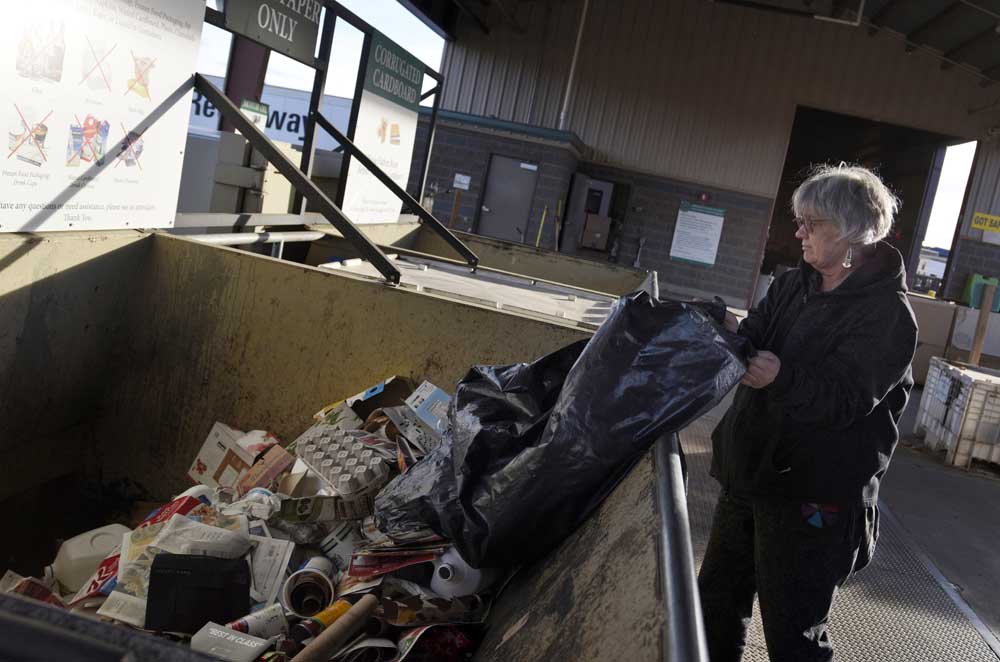Central Oregon, West Coast, brace for recycling changes
Published 8:01 am Thursday, April 26, 2018

- Sally Sundsten dumps a bag of recyclables into a commingle container Thursday at Deschutes Recycling in Bend. With China cutting back on importing American recyclables, more of those materials could make it into landfills.(Joe Kline/Bulletin photo)
Landfills and recycling centers in Central Oregon and beyond are bracing for a policy change across the Pacific Ocean, one that could change the way communities along the West Coast recycle paper and plastic.
“It could be a revolution in recycling,” said Laura Leebrick, community and governmental affairs manager for Rogue Waste Systems in Medford. “And frankly, I think it’s time.”
Trending
In July, China announced its intent to strengthen environmental regulations in 2018, and the country is planning to stop importing post-consumer plastics and unsorted paper, among other materials, at the beginning of January. The plan has left organizations in Oregon scrambling to find new markets for their recyclables, or discarding items that were once recyclable into the landfill if they can’t find new buyers.
The change has not yet hit landfills in Central Oregon as hard as those in other parts of the state, but that could change in 2018 if the change has the far-reaching implications many expect.
“People are anticipating the worst and making plans now,” said Timm Schimke, director of Knott Landfill in Bend.
China has been a common destination for recycled paper and plastics in America, as Chinese buyers could pay higher prices and afford higher levels of contaminants than American companies, according to the Oregon Department of Environmental Quality.
As a result, Leebrick said, American markets, especially those on the West Coast, have grown accustomed to shipping recyclables over to China and are working to find new buyers for their excess paper and plastic.
“If there’s no market for this material, there’s really no difference from what’s in people’s garbage,” she said.
Trending
Peter Spendelow, natural resource specialist with Oregon DEQ, said facilities in Oregon that process paper and plastic are looking at other markets in Asia, as well as paper mills in America. However, he added that processors mostly need to find buyers for specific types of recyclable material, rather than commingled or “single-stream” recycling.
“There’s no single market for any of this stuff,” Spendelow said.
Leebrick added that China’s new rules will likely affect Oregon’s smaller, more isolated communities first, as those regions have to ship their material farther for processing and lack the resources to incur additional costs.
In September, Rogue Waste Systems was informed that some of the processors they work with, from Seattle to the San Francisco Bay Area, would be scaling back the amount of material they take in response to the changing rules, according to Leebrick. As a result, the facility quickly developed an 800-ton backlog and had to start putting material outside, where rain rendered the material unmarketable.
“It happened so fast,” Leebrick said. “We hit (capacity) in a few weeks.”
Near the end of October, Rogue Waste Systems received concurrence from the Oregon DEQ, meaning that organizations can legally dispose of materials that were once recycled. As of Dec. 21, 12 facilities appeared on the department’s list of concurrences.
While none of those facilities are in Central Oregon, facilities in the region are feeling the strain. On Oct. 16, the Crook County landfill stopped accepted plastic recycling at its drop-off facility, a decision made in response to the changes in China, according to landfill manager Leroy Gray.
Gray said the landfill’s location on the east side of the Cascades made it prohibitively expensive for companies to ship plastics to large processing plants in the Willamette Valley, and the ban will exacerbate that.
“There just isn’t a market for it, period,” he said.
Schimke said Knott Landfill hasn’t begun taking in former recyclables, as the landfill is still able to find a market for the recyclables they collect. However, he acknowledged costs are going up, and added that the landfill is looking at options once the new rules take effect.
“It’s getting expensive,” Schimke said.
Long term, Leebrick said, China’s policy could alter what and how Americans recycle, but he said that shift might not be a bad thing if it forces people to pay more attention to what they can and can’t recycle.
Phil Torchio, owner and founder of The Broomsmen, a Bend company that handles waste management for weddings and other events, added that the shift could put more pressure on domestic markets for recycled paper and plastic, rather than simply offloading unclean material to China’s landfills. Down the road, Torchio said, the change could push more Oregon residents to embrace zero-waste lifestyles.
“This is an opportunity to fix the system, because it does need fixing,” he said.
— Reporter: 541-617-7818, shamway@bendbulletin.com








